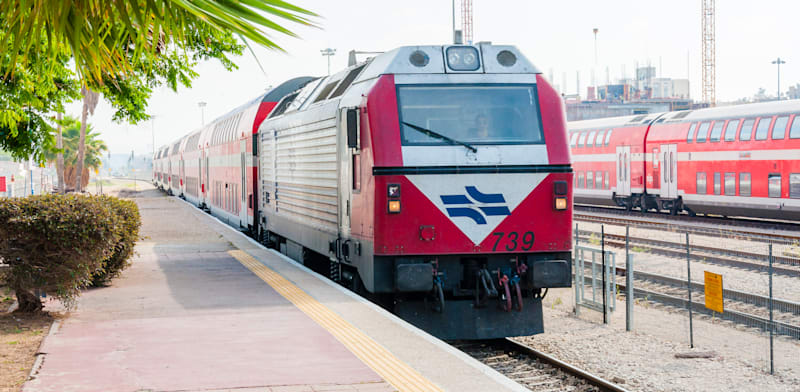One of the most major reforms to be put into the draft of the Economic Arrangements Bill, accompanying the 2026 budget, is the start of the privatization of Israel Railways, “Globes” has learned. The Ministry of Transport is strenuously opposed to such a measure.
The reform proposes a profound structural change in one of the largest government companies in Israel, which has 4,000 employees and has had problematic labor relations for years. Now, it is proposed to publish tenders for private companies to operate railway lines under regulations similar to the operation of bus lines and light rail lines.
Israel Railways is not only responsible for transporting passengers and maintaining rolling stock, but also for projects costing over NIS 50 billion for the development of the railways.
Thus the company has not only to deal with passengers, delays and breakdowns but also with the construction of huge projects. Some of these projects are currently being implemented, such as electrifying the railway, building a track along Road 431, building an additional track alongside the Ayalon highway and building an eastern inland track to bypass Tel Aviv along Road 6 between Hadera and Lod. Israel Railways is also responsible for developing real estate projects on the railway infrastructure and transporting cargo between Israel’s seaports.
Publishing tenders for private companies
Now, as part of the reform, it is proposed to separate the passenger sector from the rest of Israel Railways activity and, in effect, to publish tenders for companies that specialize in public transport to operate the lines.
The rationale is clear: although Israel Railways has undergone professionalization processes in recent years, it is unable to provide adequate service to the public on the one hand and meet the project goals on the other; due, among other things, to its size and managerial inefficiencies in handling so many different operations.
Israel Railways also serves as both a regulator and as the operator of the trains themselves and actually monitors itself. In recent years, the train punctuality index has improved mainly because the time intervals between trains has increased, so that the delay of one train has less of an impact on the train that follows.The main victims of this situation are passengers, as trains could be more frequent.
In 2024, 65.4 million train journeys made – a lower figure than in 2019. Israel Railways has apparently not recovered from the Covid pandemic, while the number of passengers on buses has returned to normal and there are far more cars on the road.
RELATED ARTICLES
Average peak-hour speed on Ayalon Highway down to 14 km/h
Tel Aviv light rail still underused
Ramat Hasharon wants railway station for the Mossad
While on buses the public is considered a captive audience, train travelers usually have alternative options of reaching their destinations. The public has been voting with its feet and uses the train less, and this is at a time when the population has grown and additional lines have been added to the network.
Constant tension between development and passenger transport
Another issue is the constant tension that exists between development and passenger transport. This is because the work is carried out on active tracks that require the reduction in frequency or the temporary cancellation of entire lines. In the current situation, decisions are made at the CEO’s discretion and his preferences and creating a separation could help balance development and service.
Finally, it is clear that privatization will lead to a cut in the number of Israel Railways employees and the employment of workers by private companies. This will inevitably affect the power balance between the workers’ committee, whose chairman was arrested earlier this week as part of the Histadrut corruption scandal, and management. In effect, the reform will weaken workers, who would no longer be able to influence the service.
The Ministry of Transport opposes the reform
The Ministry of Transport resolutely opposes Israel Railways’ reform, which is second only in size to the ports reform, which was launched last decade. Previous privatization reforms also encountered opposition from Minister of Transport Miri Regev and were dropped – for example, the proposal that appeared in the previous Economic Arrangements Law for the full privatization of Ashdod Port, the only remaining government-owned port in Israel.
In addition to the opposition to privatization, the Ministry of Transport believes that this is a service that should be provided by a government company supervised by the Ministry of Transport and not by private companies. The Ministry of Transport presents examples from around the world where privatization has not been successful.
In any case, this will be a tough test for Smotrich. Will he succeed in leading such a significant reform during the final year of the government, in the face of opposition from Regev.
Although the railway workers’ committee suffered a severe blow this week with the arrest of its chairman, it still has strong influence in the Likud and its ministers including Regev and the minister responsible for the Companies Authority David Amsalem. Alongside the political conflict that the move will generate, there is also a professional discussion taking place regarding the desired way of operating Israel Railways.
Published by Globes, Israel business news – en.globes.co.il – on November 5, 2025.
© Copyright of Globes Publisher Itonut (1983) Ltd., 2025.
























